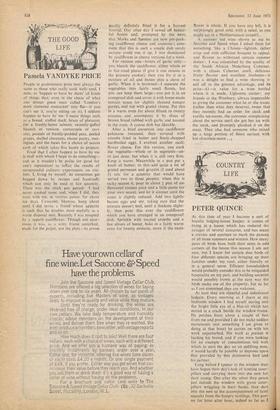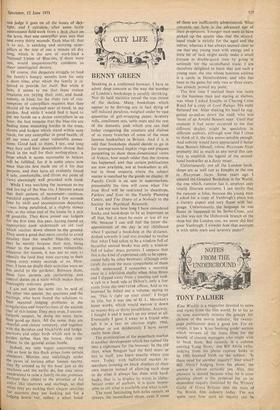PETER QUINCE
At this time of year I become a sort of bucolic lodging-house keeper: it comes of living in a house which has endured the ravages of several centuries, and has many a crevice and aperture to mark the passing of all those summers and winters. How many pairs of birds have built their nests in odd corners of the house this season I am not sure, but I know for certain that birds of four different species are bringing up their families under my, roof, either literally or in a general sense. Efficient householders would probably consider this to be misguided hospitality on my part, and building societies would possibly frown at the easy way the birds make use of the property; but so far as I am concerned they are welcome. , At least they are cheerful and industrious lodgers. Every morning as I shave at my bedroom window I find myself staring into the bright little eye of a blue-tit which has nested in a crack beside the window-frame. He perches there about a couple of feet from me and provided I do not make sudden movements (not something I am given to doing at that hour) he carries on with his work unperturbed. His work at present is feeding his brood, and if one were looking for an example of conscientious toil with which to start the day on an uplifting note, it would hardly be possible to improve upon that provided by this diminutive bird and his partner.
Long before I appear at the window they have begun their day's task of hunting cater- pillars and carrying them into the nest for their young. One after the other they percn just outside the window with green cater- pillars wriggling in their beaks, then dart into the nest to the accompaniment of faint squeaks from the hungry nestlings. This goes on for hour after hour, indeed as far as 1 can judge it goes on all the hours of day- light; and I calculate, after some fairly unstrenuous field-work from a deck-chair on the lawn, that one caterpillar goes into that nest every thirty seconds. Each blue-tit, that is to say, is catching and carrying cater- pillars at the rate of one a minute all day long, which is the sort of work-load a National Union of Blue-tits, if there were one, would unquestionably condemn as sheer unmitigated slavery.
Of course, this desperate struggle to feed the family's hungry mouths lasts for only a short time, after which the family is re- quired to provide . for itself. But while it lasts, it seems to me that these tireless creatures are paying their rent, and hand- somely, in kind; for the sheer rate of con- sumption of caterpillars requires that they should all be obtained near at hand, in my garden. And while I would find it hard to Put my hands on a dozen caterpillars in an hour, the fact remains that the blue-tits are finding these munching hordes in the trees, shrubs and hedges which stand within easy reach, for any caterpillar in good health, of all my roses and other vulnerable posses- sions. Good luck to them, I say, and long may they and their descendants choose that crack in the wall for their nesting-place: a hope which it seems reasonable to believe will be fulfilled, for it is some years now since blue-tits first made use of it for that Purpose, and they have all evidently found it safe, comfortable, and (from my point of view) alarmingly well provided with food.
While I was watching the incessant to-ing and fro-ing of the blue-tits, i became aware that their pattern of movement—cautious, watchful approach, followed a few seconds later by swift and inconspicuous departure —was being paralleled, at a slightly slower rate, at the other end of the house by a pair of great-tits, They have joined our lodgers for the first time this year, having found an appropriate nook underneath an old roof which reaches down almost to the ground. They seem a good deal more careful to avoid scrutiny than the smaller blue-tits, which may be merely because their nest, being closer to the ground, is more vulnerable: whatever the reason, it was not so easy to identify the food they were carrying to their Young every ninety seconds or so. How- ever, I have no doubt their activities were no less useful to the gardener. Between them, these four parents are performing pest control duties on a scale which makes them thoroughly welcome guests.
I am not sure the same can be said of the other two species, the sparrows and the starlings, who have found the solutions to their seasonal lodging problems in the irregularities and imperfections of the ancient Woof of this house: They may even, I uncom- fortably suspect, be doing me more harm than good up there. All the same, they are cheerful and chirpy company, and together with the thrushes and blackbirds and hedge- sparrows and other birds which nest in the garden rather than the house, they con- tribute to the general avian. bustle.
Indeed, my only regret concerning my role as host to this flock arises from certain absentees. Martins nest unfailingly under the eaves of various other houses nearby, they fly around us by the hour just as the swallows and the swifts do, but they never condescend to raise a family on our premises. Perhaps they object to the presence of hoi Polloi like sparrows and starlings, so that when they are making their elegant searches for quarters they are looking not for a lodging house but, rather, a select hotel.



































 Previous page
Previous page